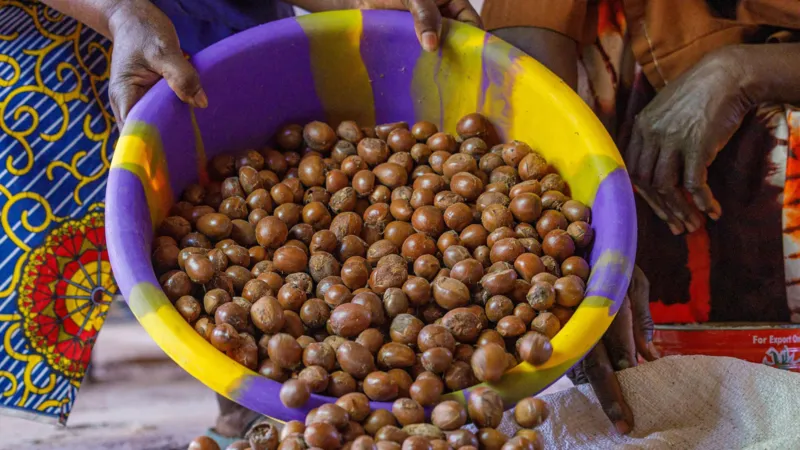The Nigerian government’s recent announcement of a ban on raw shea nut exports has sparked debate within the country’s agricultural sector, with stakeholders expressing concerns about the potential economic and social ramifications of a hasty implementation. The Alliance for Economic Research and Ethics (AERE), a prominent trade group, has called for a more measured and strategic approach, emphasizing the need for clear transition plans, sector-wide consultations, and phased implementation to mitigate potential disruptions and ensure the policy’s long-term success. While acknowledging the positive intentions behind the ban, aimed at promoting local processing and value addition within the shea industry, the AERE cautions against abrupt policy reversals that could jeopardize existing investments, trade relations, and the livelihoods of numerous stakeholders.
The AERE’s chairman, Dele Oye, a seasoned expert in Nigeria’s private sector and former president of NACCIMA, argues that a sudden ban without adequate transitional measures would undermine ongoing commitments and investment plans in the shea sector. The six-month window before the ban’s enforcement is crucial for many exporters and processors to recover capital and ramp up projects. An abrupt halt to exports would leave them stranded with unsold stock and potentially cripple their businesses. Moreover, the livelihoods of numerous stakeholders, including farmers, collectors, and traders, who depend on the shea nut trade, would be severely impacted without a clear plan for their integration into the new processing-focused industry. The AERE, therefore, urges the government to prioritize stakeholder engagement, providing clear communication about the policy’s objectives, timelines, and supporting mechanisms. This includes consultations with exporters, processors, farmers, and other actors in the value chain to ensure their concerns are addressed and a smooth transition is facilitated.
A phased implementation, according to the AERE, is essential to prevent disruptions to existing local and international shea nut contracts. This approach would allow businesses to fulfill their contractual obligations, avoid financial losses, and gradually adjust to the new policy environment. A staged implementation, combined with robust monitoring and stakeholder feedback, would provide valuable data and insights to inform policy adjustments and ensure its effectiveness. Furthermore, the government should consider providing financial and technical assistance to support the development of local processing facilities and workforce training. Upgrading existing infrastructure and building new processing plants will be crucial for increasing domestic processing capacity and absorbing the raw shea nuts currently destined for export.
The AERE proposes that the government intervene by purchasing the current raw output and unsold stock from exporters and processors. This intervention would serve multiple purposes. Firstly, it would provide immediate relief to businesses facing potential losses due to the export ban. Secondly, it would prevent the emergence of a black market for raw shea nuts, ensuring compliance with the new policy. Thirdly, it presents a profitable venture for the government, allowing it to accumulate a strategic reserve of raw material for domestic processing, stabilizing prices, and potentially generating revenue through future sales to local processors. This intervention would demonstrate the government’s commitment to supporting the industry’s transition and protect vulnerable stakeholders within the shea value chain.
Drawing lessons from successful policy transitions in other countries, such as Ghana, Malaysia, Indonesia, and India, the AERE highlights the importance of a consultative and phased approach. These countries effectively managed similar policy shifts in their respective agricultural sectors, allowing producers to adjust, upgrade, and meet new standards without abruptly terminating existing engagements. By providing adequate time, support, and clear communication, these countries successfully transitioned towards greater value addition and domestic processing, ultimately benefiting their economies and local communities. Nigeria can learn from these examples and adopt best practices to ensure a smooth and successful transition in its shea industry.
The AERE emphasizes that Nigeria’s aspiration to become a major player in the global shea industry hinges on mitigating risks associated with capacity constraints and supply gaps while maintaining positive international trade relationships. A clear transition period with explicit targets for processing capacity, quality standards, and export diversification is essential. This will provide a roadmap for the industry’s development, attract investments in processing facilities, and ensure the production of high-quality shea butter and other value-added products. The AERE remains optimistic about the potential of Nigeria’s shea industry and its ability to contribute significantly to the national economy. However, they stress that achieving this potential requires a carefully planned and executed policy transition with robust monitoring, stakeholder feedback, and multi-agency cooperation. A collaborative approach, involving government agencies, the private sector, and development partners, is crucial for achieving the desired outcomes and realizing the full potential of Nigeria’s shea industry.














